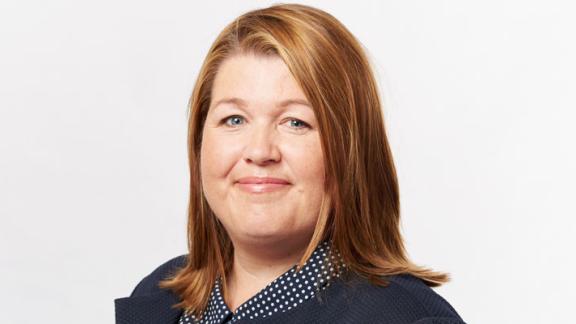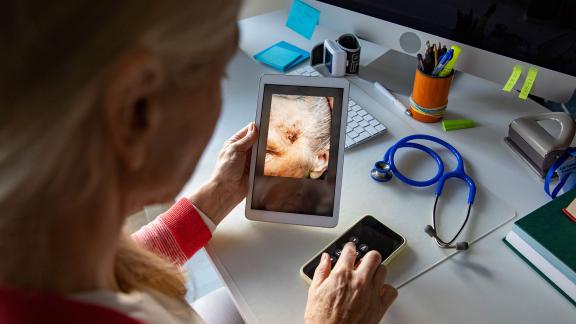The she-cession and why the time for equality is now

Women entered the COVID-19 pandemic already on an unequal footing with men and the evidence is showing this position is worsening. Are we about to enter what is being termed a she-cession?
In the UK, women do the bulk of both paid and unpaid caring in our communities. 77 per cent of the frontline NHS workforce are women, 82 per cent of the caring workforce are women, and 67 per cent of unpaid carers are women.
According to a report published in Social Sciences in January 2021, women were often put at higher risk during the pandemic due to their over-representation in the healthcare sector. The report found that female nurses saw a higher prevalence of depression and anxiety compared to other healthcare workers.
The report also showed that female healthcare workers were more likely to be redeployed into areas which put them at higher risk for exposure to COVID-19, as well as the myriad mental health issues arising from emotional and traumatic experiences.
Hierarchy of inequality
The most depressing fact is there is a hierarchy of inequality. If you are an ethnic minority woman then the disparities are simply worse: you are less likely to be represented in senior role, your health outcomes are worse and your pay gap is likely to be worse (Review of the Gender Pay Gap in Medicine).
In August 2020 the Health and Care Women Leaders Network published a report into the impact of the pandemic on women in health care. Over 1,300 women responded to our survey, describing the struggles, pains and fears women working in health and care services have faced. The physical and emotional impact due to caring responsibilities both in and outside of work are significant.
While women have been leading the battle against COVID-19 on every front line, they have been losing the battle for equality at the same time
In our response to the Department of Health and Social Care’s Women’s call for evidence for its Women’s Health Strategy, we said that that the impact of COVID-19 on the NHS workforce must be taken into account, and that national NHS leaders should develop a women’s health strategy for the NHS workforce. As an organisation where women make up more than three quarters of the workforce, and whose aim is to improve health, the NHS should be leading in this area.
While women have been leading the battle against COVID-19 on every front line, they have been losing the battle for equality at the same time. It has even got a name: the disproportionate economic impact on women has been described as a ‘she-cession.’
Workplace gains are reversing
The World Economic Forum and the Women in Work Index 2021 report published by Price Waterhouse Cooper in March found that the pandemic has reversed many of women's workplace gains, with women spending 7.7 more hours a week than men on unpaid childcare last year, forcing some women to quit their jobs altogether.
It warned that the effects of the pandemic have threatened to reverse the important gains that have been made in the last decade, as many of the negative impacts are disproportionately being felt by women.
Our network members reflected a similar picture to us in May this year, when we reported that the impact of the pandemic on the female workforce has demonstrably worsened since 2020, and more women are reporting an even greater negative impact on their physical and emotional wellbeing. This is linked to the increase in the number of hours women report spending on their caring responsibilities both in and outside of work. The impact of these responsibilities may be greater for women from black, Asian, and minority ethnic backgrounds.
The evidence couldn’t be clearer and the time to act for equality has never been more critical. The network will continue work to support this.
Now is the time for all leaders across health and care to stand together for equality but also to recognise the intense pressures many women are under as a result of this pandemic
We revealed in our Action for Equality report that we need 150 more women in board-level positions to reach our goal of truly diverse boards within the NHS and made another 16 recommendations for action. We will continue to work with others including NHS England and NHS Improvement to progress the recommendations in the report.
Now is the time for all health and care leaders to stand together for equality but also to recognise the intense pressures many women are under as a result of this pandemic. We need to lead each other in kindness, compassion and self-care, look after each other, listen to each other and help to lift each other up the leadership ladder.
Together we have much to do in 2022 to progress our network priorities and support women and allies working across health and care. We have plans to further support our members’ professional development, will offer a packed schedule of events and workshops, and we will be providing our support to @NHSProjectS, which campaigns to improve the personal safety of women working in the NHS.
Maintaining our energy and working together through our Network of Women's Networks, we will support and champion each other and our sister networks to drive positive change.
There is much for us to do to achieve equality for all - the time is now!
Sam Allen is chief executive of Sussex Partnership NHS Foundation Trust and chair of the Health and Care Women Leader’s Network. You can follow Sam on Twitter @samanthallen
Find out more about the network and how you can support it at nhsconfed.org/womenleaders



